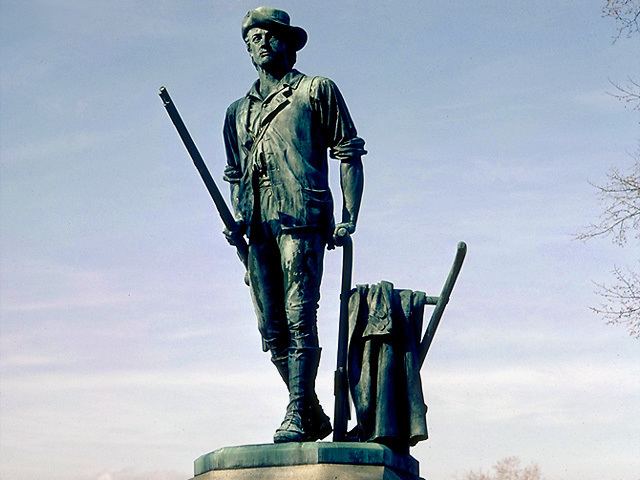On This Day: Isaac Davis is Born
On this day, February 23rd, in 1745, Isaac Davis is born to Mary and Ezekial Davis in the village of West Acton. Isaac married Hannah Brown on October 24, 1764 and they had four children–two boys and two girls. Not much is known of Isaac’s life before 1774 except that he was a gunsmith, blacksmith and farmer.
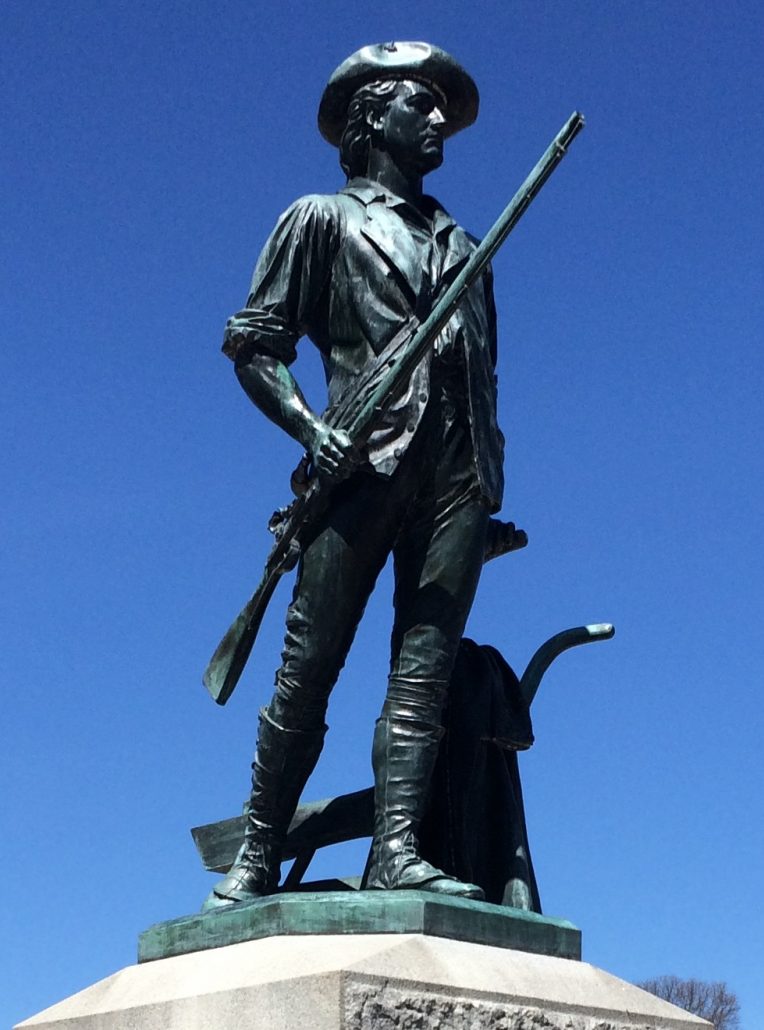
In November 1774, the town of Acton raised a company of Minutemen and Davis was elected captain. As Isaac was a gunsmith, he outfitted his company with bayonets and cartridge boxes, both atypical for colonial militia of the time. Davis also insisted on twice weekly marksmanship practice at an improvised shooting range at his house.
By January of 1775, the town of Acton agreed to pay the men 8 shillings for each day of drilling. As a result, the Acton militia under Davis was one of the best equipped and trained companies in all of colonial New England.
Early in April 1775, Isaac and Hannah returned to their home to find an owl perched on Isaac’s flintlock which was displayed over the fireplace mantel. Isaac forbade anyone to disturb the owl and it remained in his home for several days; the owl’s presence was interpreted as an omen that once he was engaged in battle, he would not survive.
April 19, 1775
On April 19, 1775 fate caught up with Isaac Davis. In the early morning, Paul Revere, William Dawes, and later Dr. Samuel Prescott would ride through the countryside outside of Boston to warn colonists that the “Regulars were out”. It is most likely that Prescott was the one who alarmed the Acton militia.
Per previous plans, the Acton militia gathered at Davis’ home and prepared for battle by making bullets and checking their equipment. Some in the company had floured their hair so they would present a gentlemanly appearance to the British troops.
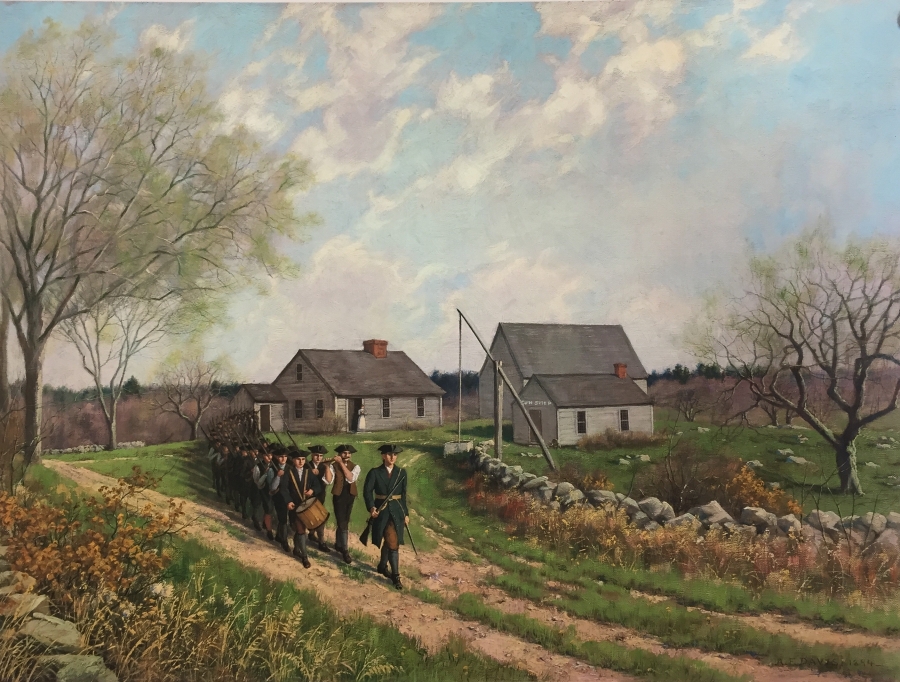
When approximately 30 of the 40 or so members of the Acton militia had gathered, Davis ordered his company to march off down the road to Concord. Soon after stepping off, Isaac turned back to see his wife Hannah standing in the doorway of his home. He went to her and told her
Take good care of the children.
Captain Isaac Davis
Then he was gone.
On the road to Concord, fifer Luther Blanchard and drummer Francis Barker struck up the company’s signature tune, ‘The White Cockade,’ as they strode along.
Soon Captain Davis and the Acton militia passed the farm of Colonel James Barrett. They could see that the farm was being searched by British soldiers and Davis gave passing consideration to attacking the small detachment. However, his orders were to proceed to Concord which is what he ultimately did.
The Acton militia reached the Old North Bridge outside of Concord around 9:00 AM that morning. Around 500 colonial militia from Concord, Lincoln, and Bedford had gathered on Punkatasset Hill overlooking the bridge which was controlled by a party of approximately 100 British Regulars.
Colonel Barrett called for a council of the officers present to determine whether or not to attack the British Regulars at the bridge. Simultaneously in Concord itself, the main detachment of the British troops were searching the town for powder, firearms and supplies. They found little as the colonists had either moved their supplies or hidden them before the arrival of the British. The Regulars did find some cannon which they disabled by breaking off the trunnions and throwing the carriages on a bonfire.
The colonists near the Old North Bridge saw the smoke from the bonfire and assumed the British were burning the entire town.
Are we to let the British burn down our town?
Militia at the Old North Bridge
Colonel Barrett, seeing the smoke and regarding the pleas from his fellow militiamen, made the determination to attack the Regulars at the bridge. The first militia company commander asked by Barrett to lead the attack declined. He next turned to Captain Isaac Davis with the same request; Isaac famously responded:
I have not a man that is afraid to go.
Captain Isaac Davis
Captain Isaac Davis and the Acton militia led the colonists in a two-abreast column towards the British at Old North Bridge. Each man was instructed:
Do not fire until fired upon!
Instructions to Concord Militia
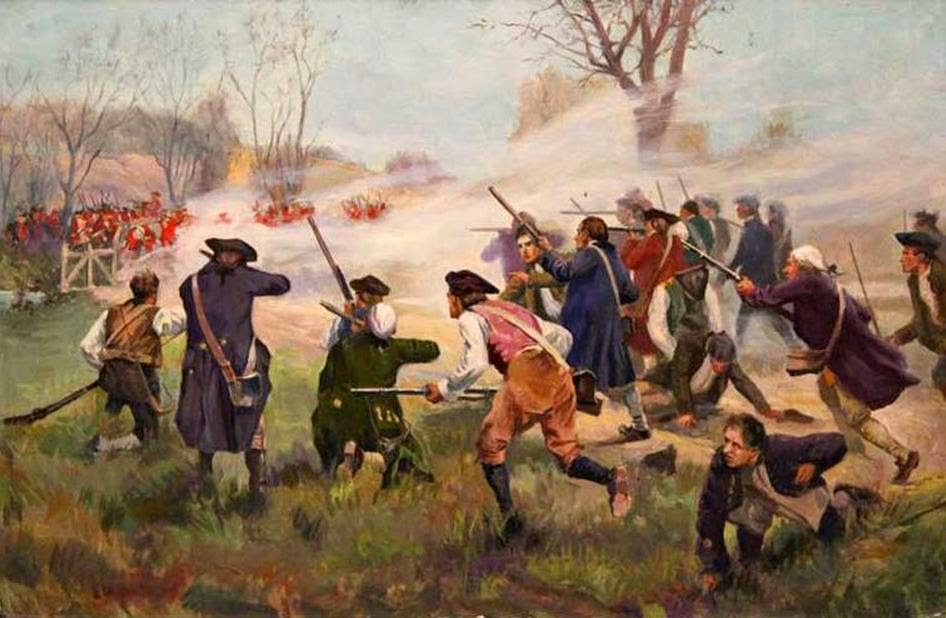
When the colonists had closed the distance to about 75 yards, a shot rang out from the British lines. The fifer Luther Blanchard was hit and wounded. Upon hearing the initial shots, the remainder of the British Regulars, assuming that they had failed to hear the command to fire, commenced a ragged volley.
Captain Isaac Davis was shot through the heart and fell to the ground, dead where he lay. A private, Abner Hosmer, was also felled by the initial British volley.
Seeing his comrades fall next to him, Colonel John Buttrick called out to his men
Fire, fellow soldiers, for God’s sake fire!
Colonel John Buttrick to militia at Old North Bridge
The colonial volley forced the British Regulars to retreat back towards Concord and the main body of British soldiers.
Memorials to Captain Isaac Davis
In February 1851, shortly after the 75th anniversary of the Battle of Concord, Rev. James Woodbury of Acton petitioned the Massachusetts General Court for funds to build a large monument to Isaac Davis in Acton. $2,000 was appropriated for construction of a monument and a 75 foot stone obelisk was dedicated on October 29, 1851.
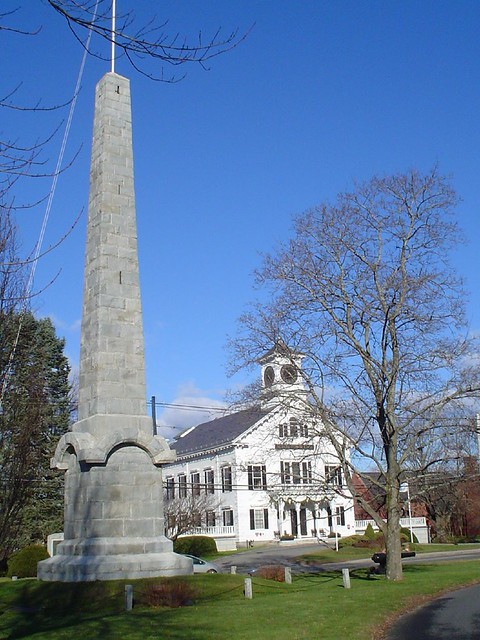
The remains of Captain Isaac Davis, Abner Hosmer, and James Hayward (a member of the Acton militia killed later in the day at Lexington) were moved and re-interred beneath the monument.
On the base of the statue is inscribed the first stanza of Ralph Waldo Emerson’s Concord Hymn written in 1836:
By the rude bridge that arched the flood,
Their flag to April’s breeze unfurled,
Here once the embattled farmers stood
And fired the shot heard round the world.
Ralph Waldo Emerson
At the base of the monument is a stone brought from the vicinity of the Old North Bridge in Concord which is said to the stone upon which Isaac Davis’ head fell when he was shot.
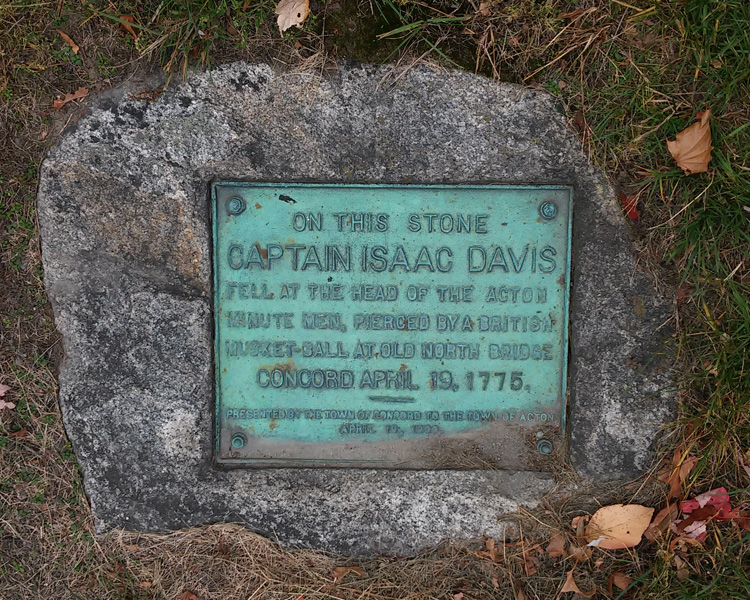
In the town of Concord, a statue called The Minute Man was placed on the approximate site of Isaac Davis’ death. The statue is the work of sculptor Daniel Chester French, who is better known for his 1920 statue Abraham Lincoln which resides in the Lincoln Memorial in Washington D.C. French used descendant’s of Isaac Davis as models for the statue and Isaac Davis’ plow, now on display in Acton’s Town Hall, as the model for the plow in the statue.
